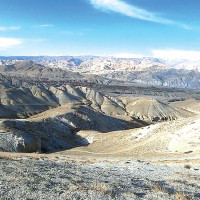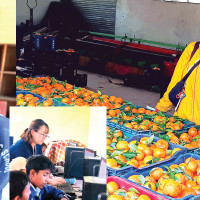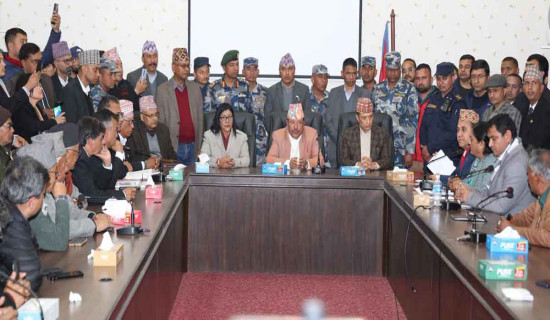- Friday, 16 January 2026
In The Winds Of Time
"Culture is an inexhaustible mountain river that brings more and more new knowledge, whose value will be appreciated by the next generation." Sitting by the fire in these wet winter days, watching its boisterous dance, my memories flash back to the day I met Ramanand Tiwari. I don't know what a magical force brought us together, but at the meeting, after exchanging a few words, I realised that we have something in common. In front of me stood a small white-bearded god who blessed me with a shower of fragrant flowers over my head. This is how I remember him at Pilgrims Publishing House, Varanasi.
Every story has a beginning. When, as a journalist, the winds of work blew me away to work in Russia, I happened to meet a Siberian shaman named Karagai Kam and Iliya Smolin. There comes a period in everyone's life when ignorance about the future leads to despair. The existing situation created a favourable environment for reaching out for a helping hand.
"You will meet a small, white-clothed bearded man older than you..... You will have to cross the river (difficulties), and then everything will change...” Those were the words of a Siberian shaman, which, in a fateful turn, came true. A year later, when I met him on the streets of Kathmandu, I remembered what he had said about the bearded man—that fate had brought us together. It was the first time in my life when, overwhelmed by the uncertainty of the future, I turned to a shaman for help.
That very day, when I met Mr. Ramanand at Pilgrims Publishing House, the prophecy of Karagai suddenly dawned in my memory. In my thoughts, I joined on the trip, which, in the true sense of the word, would correspond to the name of the bookstore, Pilgrims.
The huge treasure of knowledge collected by Ramanand’s own hands during decades of travel lies on the shelves of bookstores in Kathmandu and Varanasi. It must be said frankly that any visitor will find a topic suitable for his taste, such as esoteric sciences, anthropology, history, astronomy, religions, anatomy, political economy, architecture, and so on. Art of various genres and even specific topics such as health, Ayurveda, and the intimate world.
The interest does not pass by antiques arranged in a thematic sequence with books that enrich the overall calorie content and to which the bookstore employees pay special attention. The first floor is like an exhibition hall, which, with the background of baroque music, invites the visitor to separate himself from the noisy everyday life, pick up a book, and immerse himself in thought.
It is a real pleasure for everyone who visits here. The Guest Book evidences numerous expressions of gratitude, exceeding dozens in number. Words of thanks from all corners of the world rain down like a mountain spring.
... I have finally found the book I have been looking for a long time...
... it is a wonderful repository of knowledge...
... kind employees do not refuse to help...
There is an employee named Sunil who has been working in the bookstore since its early days. Ramanand's daughters, Elizabet and Kahani, with their father's care, have created a real world of attraction in the very centre of Kathmandu. The influx of more and more new people into the bookstore causes true joy, indicating that interest in books has not disappeared.
And if you have a chance to meet Ramanand, the owner of Pilgrims Book House, then he will embody the spark of joy for you and will actively engage in various topics under the influence of fragrant coffee.
The traditions of ancestors still live in the consciousness of Nepalis, who thank each guest for his visit. This respectful gesture is shown at the entrance of the bookstore by the entire Pilgrims Book House team.
January 22, 2024, was a special occasion for the bookstore in Nepal and possibly the whole world, as a new book, SANATANI RAMA, by Vivekanand Jha, was released. It is a journey through past civilizations, presenting the main theme in chronological order, which in the course of history comes up with a vivid comparison in the fields of politics, economy, and religion.
The author has put his thoughts in a book. An epochal insight from different points of view. Not everyone is clear about Sanatani, whose history can be traced centuries back. It is the forgetting of ancient civilizations whose cradle of wisdom continues to move, reminding future generations where we come from, as a starting point, and who we are. In the cross-section of the era, the Sanatani period, with a gap of many centuries, could be compared with African prehistoric religions such as Aksumites, Woodoos, Numibians, and Mazgabaz.
In Scandinavia, as well as in the Baltic countries and in Europe, it was so-called paganism, or darkness, when idolatry was practiced, for which the most suitable term would be piety rather than religion.
All pagan and other religious countries united under a common motto: "maintaining a strict relationship with nature." The force of nature and the ancient man living in harmony formed a common synthesis. The new religions, influenced by various selfish interests, have moved away from reality and have created irreparable harm by deliberately distorting originality. It would be wrong to deny that all religions have their origins in paganism and piety.
Vivekanand, in his book, gives an indirect hint to India and the youth of the whole world about where the answer is to be found. Is it self-identification or patriotism? The book has powerful words and a flow of thoughts. Continuing his thoughts, the author reminds us that the upcoming event is historically significant for India.
Little wonder then that the historic occasion of January 22, 2024, is the rediscovery of its moorings and its civilization soul, which eluded Sanatanis for almost five hundred years, as the author says. "If your first love was a book, then love it for ever." This motto has the magical allure of addictive power.
(Persijs, a press photographer from Finland, is studying the culture and costumes of Nepal.)















